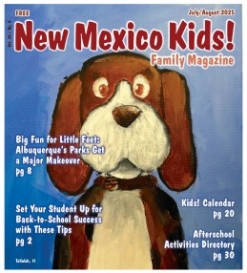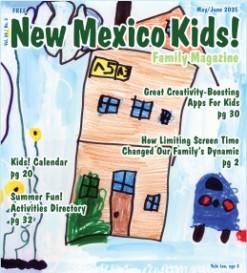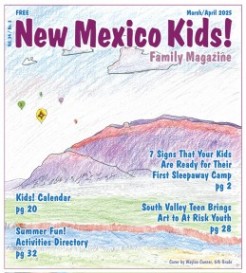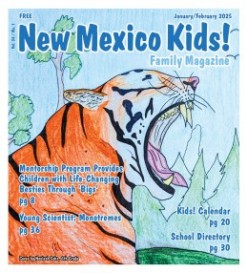University Offers Varied Exhibits
UNM Museums
University Offers Varied Exhibits
June 8, 2022By WENDY KAPLAR
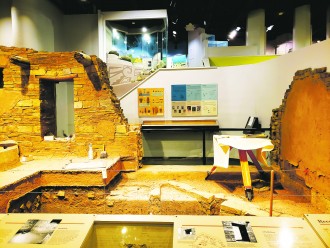
The University of New Mexico (UNM) is recognized for its commitment to providing an exceptional education and profound implementation of applied research. Students, instructors and researchers utilize the various UNM museums to house, study, educate and display an array of impressive collections. Parents and caregivers can use the university museums as a cost-free public resource to nurture and encourage their young scholars’ budding interests. With groundbreaking artwork, rare entomology specimens, colorful native plants, simulated early cave paintings, rare earth minerals and a meteorite falling from space, the UNM Albuquerque campus museums will appeal to a wide range of learners. Admission is free for each university museum, so visitors can plan to tour one or all the facilities.
MAXWELL MUSEUM OF ANTHROPOLOGY
Founded in 1932, the Albuquerque Museum of Anthropology (now known as the Maxwell Museum of Anthropology) holds the distinction of being Albuquerque’s first public museum. Throughout its 90 years, the museum has acquired over 3 million Southwestern archaeological treasures. The museum’s design is meant to engage visitors of all ages. The first exhibit the visitor experiences is a simulated and highly detailed archeological dig. The next is a modeled maw of a dark cave entrance complete with replicated paintings of early cave dwellers. Young visitors will delight in the immersive experiences that this state-of-the-art educational museum offers.
The museum also has many engaging educational outreach programs and materials. The “Traveling Trunk” includes an on-site anthropological-themed seminar by Maxwell Museum docents. The presentation offers corresponding grade-appropriate, hands-on and applied knowledge activities. Maxwell Museum also has well-developed instructional aid kits to loan to educators for a small fee. The kits are designed to meet the needs of specific grade levels, and include such themes as Southwestern textiles, the history and culture of New Mexico, Chinese history and culture, indigenous Alaskans of the Bering Sea Coast and the Maya people of the ancient and modern worlds.
Additionally, the museum has several in-house instructional thematic events, tours and field trips. The museum encourages visitors to call and schedule one if touring as a large group. The Maxwell Museum of Anthropology is open to the public Tuesday through Saturday from 10 a.m.to 4 p.m. For more information: 505-277-4405 or https://maxwellmuseum.unm.edu.
UNM ART MUSEUM
Constructed in 1962 and chiefly recognized for its status as a teaching facility, the UNM Art Museum is a focal point of culture and art for the campus and the Albuquerque community. Accordingly, the museum is committed to not setting a price of admission to safeguard the ability of all to view and connect with art. When touring the museum, visitors are exposed to collections of historic and contemporary paintings, sculptures, drawings, photographs and lithographs. The museum also hosts art exhibitions and workshops. Visitors are encouraged to interact with their tour guide, so children should feel comfortable asking questions and connecting with the artwork. Groups of 10 or more should schedule their visit to allow for an optimal encounter.
Located in Popejoy Hall, the UNM Art Museum is open to the public Tuesday through Thursday from 10 a.m. to 5 p.m. and Friday and Saturday from 10 a.m. to 7 p.m. For more information: 505-277-4001 or https://artmuseum.unm.edu.
SILVER FAMILY GEOLOGY MUSEUM
Do you know a young person who loves collecting rocks, minerals and fossils? Then a visit to the Silver Family Geology Museum is in order. In 1936, esteemed professor and museum founder Dr. Stuart A. Northrop acquired a space in what is now Northrop Hall. After receiving some custom-made aluminum framed glass cases, Northrop started building displays of fossils and minerals. Professor Northrop was later made curator of what is now known as the Silver Family Geology Museum. Today area schoolchildren regularly visit the museum to learn more about and explore the study of geology.
Staff request that those planning to tour the Silver Family Geology Museum as a group phone ahead to schedule their visit. The museum is open to the public Monday through Friday from 8 a.m. to noon and 1 p.m. to 4:30 p.m. For more information: 505-277-4204 or https://eps.unm.edu.
METEORITE MUSEUM
The University of New Mexico’s Meteorite Museum retains one of the most extensive meteorite collections in the world. The highlight of the Meteorite Museum is a metric ton stony meteorite that UNM researchers found in 1948 after a meteor shower rained down upon the borders of Furnas County, Nebraska, and Norton County, Kansas. The meteorite collection is a superb teaching tool, so Albuquerque elementary and high school students often tour the museum with their schools. Unfortunately, due to the Covid-19 virus, the Meteorite Museum has been closed temporarily to the public. Potential visitors are encouraged to visit the Meteorite Museum’s website to find out when it reopens.
For more information: 505-277-1644 or https://meteorite.unm.edu/meteorites/meteorite-museum.
MUSEUM OF SOUTHWESTERN BIOLOGY
For more than a half-century, the Museum of Southwestern Biology has served the global scientific community as a foremost biodiversity reserve. The museum is chiefly an educational resource for university students. Still, older children and teens interested in concepts such as adaptation and the natural heritage of New Mexico would welcome a tour. Aspiring zoologists will appreciate a first-hand viewing of the museum’s collections of invertebrates and vertebrates. Those who plan to visit the Museum of Southwestern Biology must contact the museum directly as tours are given on an appointment-only basis.
Located in the CERIA building, the Museum of Southwestern Biology is open by appointment only Monday through Friday from 8 a.m. to 5 p.m. To arrange a visit, call 505-277-1360.

